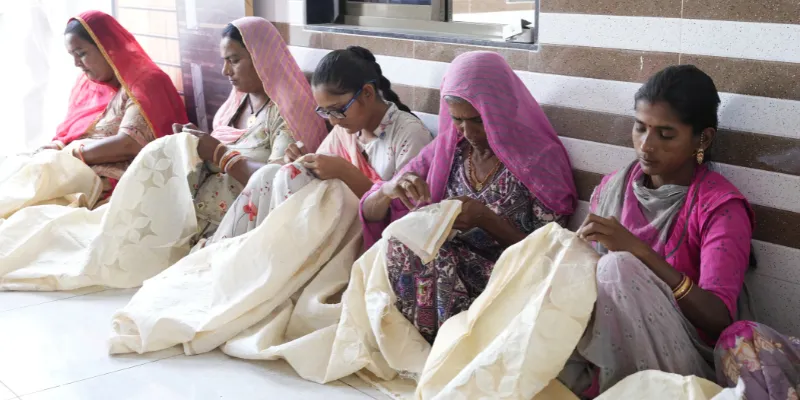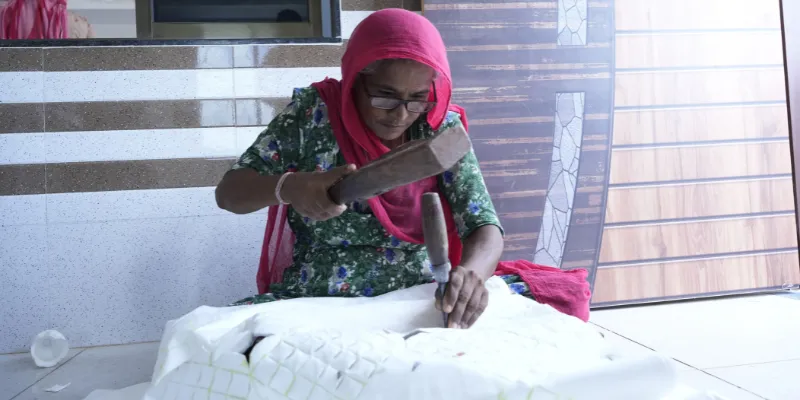How applique artisan Vishnu Suthar is giving identity to a traditional craft and empowering women in Gujarat
Vishnu Suthar is an applique craft artisan from Tharad, a town in Banaskantha district in Gujarat. He employs 300 women artisans who produce a range of applique work products that are sold all over India.
When Vishnu Suthar was in his late teens, he started supplementing his family income by delivering newspapers from door to door. Though his father was an artisan skilled in applique work, Suthar, a school dropout, had little motivation to take up the craft.
Handmade applique is a type of ornamental needlework in which pieces of fabric in different shapes are attached to a larger canvas to form patterns. Applique work is usually done on sarees, dupattas, curtains, pillow covers, and bedspreads.

Vishnu Suthar, extreme left (sitting) with a team of artisans and Nilesh Priyadarshi (standing, left)
As a child, Suthar saw his father and other artisans toiling to fulfil the few orders they received from an NGO, but it never occurred to him that applique work could become his calling.
However, in 2008, an advertisement he came across in a newspaper, during one of his delivery runs, changed his life forever.
The ad was from the Gujarat government announcing an exhibition-cum-sale of handicrafts in Ahmedabad. It also mentioned that all arrangements would be made by the organisers.
This piqued Suthar’s interest and he began collecting applique pieces—pillow covers, bedspreads, and whatever the artisans in his community could put together in a short span of time.
“I took just one bag of products and got an overwhelming response,” recalls Suthar, who took the traditional craft seriously only at the age of 20.
“Until I saw the advertisement, I had very little interest in applique work. After I understood that these opportunities would allow me to provide work to more artisans, I started learning applique work from my father and started working on the craft along with others,” he says.
One thing led to another and soon Suthar was taking part in many exhibitions.
“It became clear to me that I could take the art forward,” he says.
Suthar took it forward and rallied together a community of artisans, mainly women, from the villages of Banaskantha district, where he is based.
Creating socio-economic impact

The impact of Suthar’s work is visible through the lives of 300-odd women who are associated with him.
“The women in this region follow a strict purdah system. They do not go anywhere unless accompanied by a male member of their family,” says the artisan entrepreneur.
Material for applique work is delivered to these women and the finished work is picked up when it’s ready.
Apart from employing women artisans, Suthar has also trained a number of women in the craft.
The villages these women belong to, especially those in the border areas, have no roads, power or agriculture, and families are mired in poverty, remarks Suthar.
“I have been able to pay the women decent wages for doing applique work. Earlier they used to be paid only Rs 10 for a day’s work of embroidery, now they get around Rs 200 for five hours work,” he explains.
But he doesn’t view his association with the people of these villages as just a business transaction. He is like a member of their families.
The villagers reach out to him if someone is sick in their family and needs to be taken to the hospital. They also lean on his support for the education of their children.
In fact, he has continuously impressed upon the villagers the importance of educating their girls. His efforts have paid off, and now some of the villagers even send their girls out of their village to continue their schooling.
Tracing the roots
Suthar’s family were Hindus settled in Pakistan, primarily engaged in farming. His grandmother was a skilled artisan and a master in applique work.
His grandfather fled from Nagarparkar in Sind, Pakistan, with his family, during the war of 1971. The family then decided to settle down in Barmer district in Rajasthan, close to the border.
Though Suthar was not born then, he understood, from his father’s accounts, that life as a refugee was quite hard.
In 1974, during their stay at a refugee camp, a government official asked the families that had migrated from Pakistan if they had a skill that could help them set up a business. That’s when the idea of getting back to applique work took root.
“My grandmother was involved in applique work. She used to take orders from the villagers and in return would get grain or other household items. But no one thought of it as a business,” says Suthar.
His father, grandfather, and a few others started doing what they knew best. With the help of an NGO, they started getting orders for applique work.
But it was not enough to make a living. Back then, there was little recognition for the skilled craft, and they earned just enough to get by.
Suthar’s family then decided to shift to Gujarat in 2000, a state known for its rich craftsmanship and traditional craft forms.
Since then, the family has been practising the craft form, which was later given a new lease of life by Suthar.
Aiming high

A woman artisan busy with applique work
Associating with the Craft Roots, an NGO, has given more visibility to Suthar’s work. Today, he gets orders from individual clients and a formidable base of retail customers from 10 states in India.
Regular orders also come from the Government of Gujarat. The applique products are sold through the state government’s Gurjari outlets, apart from exhibitions.
At one such exhibition, the then chief minister of Gujarat, Anandiben Patel, bought two applique work sarees and also introduced Suthar to Gramshree Sanstha, an NGO, which gave him a lot of work.
Two-and-half-years ago, Suthar met Nilesh Priyadarshi, Co-founder of Kaarigar Clinic, an Ahmedabad-based organisation that helps artisans to carve their own brand identity, by providing market linkages and helping them build a marketplace.
Kaarigar Clinic has helped Suthar to expand his range of products to reach a diverse range of customers. It has also helped him establish his identity as an artisan.
“We are aiming to take his products to a global market,” says Priyadarshi.
Going beyond sarees and bedspreads, Suthar is exploring other product categories in which applique work can be done. He is in the process of designing women’s wallets, passport pouches, and mobile phone covers to reach a wider market. He also wants to reach out to more women artisans and empower them through the craft form.
“My aim is to give work to 1,000 women artisans by the end of the year. Currently, 130 more artisans are being trained by us,” says the artisan entrepreneur.
“Kaarigar Clinic has ignited a spark in me to help artisans, and I want to carry it forward. I believe when the ecosystem grows, the community grows,” he signs off.
Edited by Swetha Kannan






